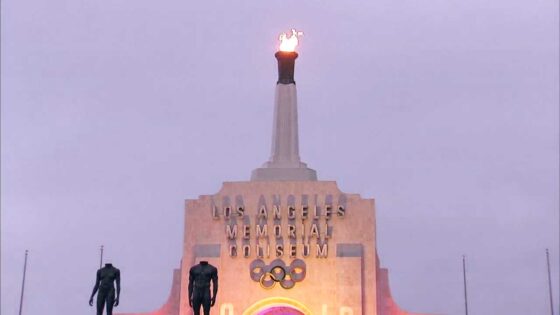On March 16 this year, history thundered back to life on the streets of Los Angeles. Matt Richtman, a name not yet etched into the annals of American distance running—until now—shattered a 31-year drought by claiming victory at the LA Marathon in a blistering time of 2:07:56. Not since Paul Pilkington’s (the four-time Olympic Trials qualifier) surprising win in 1994 had an American broken the tape first in LA, and Richtman didn’t just win—he obliterated the field. But this wasn’t just a personal milestone or a patriotic headline. This was something more. This was a statement.
Because the course Richtman tore through? It’s not just any route—it’s a rough draft of what could become the 2028 Olympic marathon course. And that’s where things get… complicated. How?
“The course, I know they haven’t planned it out yet,” Richtman said after his win, still catching his breath but already looking ahead. “It’s probably something similar or at least on similar parts.” A diplomatic answer, maybe. But read between the lines, and there’s a flicker of unease.
Three years out from hosting the world’s greatest athletes, LA still doesn’t have a finalized Olympic marathon route. And while that might sound like bureaucratic foot-dragging, for elite runners, it’s much more than that—it’s the terrain they’ll train their lives around. And now, it is not only about the marathon. There’s another Olympic sport facing the same rough end in the city of California.
On April 8, Alex Schiffer of Front Office Sports pulled back the curtain on a surprising Olympic twist: Santa Monica—the sun-drenched cradle of beach volleyball—won’t be hosting the iconic sport at the 2028 Los Angeles Olympics. That’s right. The city that gave rise to beach volleyball culture won’t even get a seat at its own table when the world tunes in. Why?
As Schiffer’s piece outlines, it comes down to “a number of factors,” including murky negotiations around community benefits and financial guarantees. But beneath the polished press statements and polite public diplomacy, there’s a deeper story.
Santa Monica mayor Lana Negrete struck a diplomatic tone in her response, expressing gratitude that the city will still play a role as a regional partner in the Games. But let’s not mistake grace for indifference. Because in Santa Monica, the sting is real—and it might just be tied to a different kind of scoreboard: the financial one.
Back in October, Santa Monica released a striking study projecting the economic outcomes of hosting Olympic events. Hosting? A net loss of $1.45 million. Not hosting? A potential gain of $10 million, mostly from tourism revenue as the city keeps its beaches, shops, and landmarks wide open instead of walled off by security perimeters and temporary venues.
Those numbers don’t lie. And while no one in official channels is directly linking that study to the decision, the math seems to speak for itself. But here’s the kicker: Santa Monica’s not alone. Across California, whispers of Olympic sticker shock are turning into full-on conversations. Cities that once saw the Games as a golden opportunity are now quietly crunching the numbers and asking hard questions: Can we really afford this?
The Olympic struggle is real, not only for the athletes but also for the venues
The Olympics may be a global spectacle—two weeks of dazzling performances, national pride, and wall-to-wall media coverage. But behind the fireworks and fanfare, it’s the local leaders left holding the calculator. And in Los Angeles, that calculator is starting to overheat.
In March, CNBC’s The Bottom Line dropped a sobering report: the City of Angels is staring down the barrel of a potential $1 billion budget shortfall in the upcoming fiscal year. That’s not just a financial hiccup—that’s a full-blown fiscal migraine. Now, pair that with the fact that LA is the centerpiece of the 2028 Olympics, and suddenly, the gleam of gold medals comes with the weight of gold-plated costs. Hosting the Games is an honor, sure. But it’s also a logistical, financial, and political juggling act. And if any of the organizing entities—whether the LA28 committee or affiliated contractors—hit turbulence, guess who’s next in line to cover the fallout?
Yep. The taxpayers. With city services already stretched, housing challenges compounding, and infrastructure needs stacking up, residents could find themselves caught in a financial bind if the Olympic budget doesn’t stay airtight. No one’s sounding the alarm just yet—but the warning signs are flashing. Fast.
The big question now: can LA pull off a world-class Games without passing the bill to its own people? Or will the Olympic dream come with a price tag that extends far beyond the closing ceremony? For a city that loves a good blockbuster, the lead-up to 2028 is starting to look like a high-stakes drama—one where the final act hasn’t been written yet.
The post Bad News for America as Iconic Olympic Sport Pulled Out of Its ‘Home’ Over 7-Figure Fear for LA 2028 appeared first on EssentiallySports.



